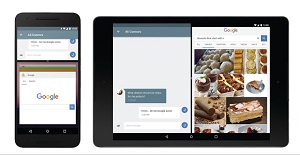News
Google Finalizes Android N APIs in New Developer Preview
- By David Ramel
- June 16, 2016
Google has just finalized the APIs for Android N -- the working name for the next release of its mobile app OS -- in its 4th Developer Preview.
The preview incorporates the Android N final SDK in advance of this summer's expected general rollout of the OS, which has yet to be officially named.
The finalized SDK can be downloaded directly from the Android Studio IDE via its SDK Manager. Google said developers with devices registered for the Android Beta Program will soon get the updated developer preview automatically via an over-the-air update.
"Once you've installed the final SDK, you can update your project's compileSdkVersion to API 24 to develop with the Android N APIs and build and test on the new platform, for new features such as multi-window support, direct-reply notification and others," Google engineering exec Dave Burke said in a blog post yesterday. We also recommend updating your app's targetSdkVersion to API 24 to opt-in and test your app with Android N-specific behavior changes."
Google in March released an Android N preview earlier than usual in the release cycle to solicit developer feedback sooner.
In addition to the multi-window support -- which provides the ability to launch activities in split-screen mode on mobile devices -- and direct-reply notifications, other new features include bundled notifications; better efficiency in battery and memory use; Data Saver mode to help reduce cellular data use by apps; and more.
 [Click on image for larger view.]
Multi-Window Support (source: Google)
[Click on image for larger view.]
Multi-Window Support (source: Google)
Included in that "more" is improved support for Java 8, the latest version of the official programming language for Android development.
"We're excited to bring Java 8 language features to Android," Burke said in March. "With Android's Jack compiler, you can now use many popular Java 8 language features, including lambdas and more, on Android versions as far back as Gingerbread. The new features help reduce boilerplate code. For example, lambdas can replace anonymous inner classes when providing event listeners. Some Java 8 language features -- like default and static methods, streams, and functional interfaces -- are also now available on N and above. With Jack, we're looking forward to tracking the Java language more closely while maintaining backward compatibility."
Burke highlighted even more new developments in yesterday's blog post.
"Along with the Android N final SDK, we've also updated the Android Support Library to 24.0.0," he said. "This allows you to use multi-window and picture-in-picture callbacks, new notification features, methods for supporting Direct Boot, and new MediaBrowser APIs in a backward-compatible manner."
He said developers have the option of targeting apps at Google Play alpha, beta or production channels.
"Now that you have a final set of APIs, you can publish updates compiling with, and optionally targeting, API 24 to Google Play," he said. "You can now publish app updates that use API 24 to your alpha, beta, or even production channels in the Google Play Developer Console. In this way, you can test your app's backward-compatibility and push updates to users whose devices are running Developer Preview 4."
Developers who won't get the Developer Preview 4 automatically through the Android Beta Program can register their eligible Android device and get this and future updates. Yet another option is to manually download the update and flash eligible devices, which include Nexus 6, Nexus 5X, Nexus 6P, Nexus 9, and Pixel C devices, as well as General Mobile 4G [Android One] devices and the Sony Xperia Z3.
About the Author
David Ramel is an editor and writer at Converge 360.